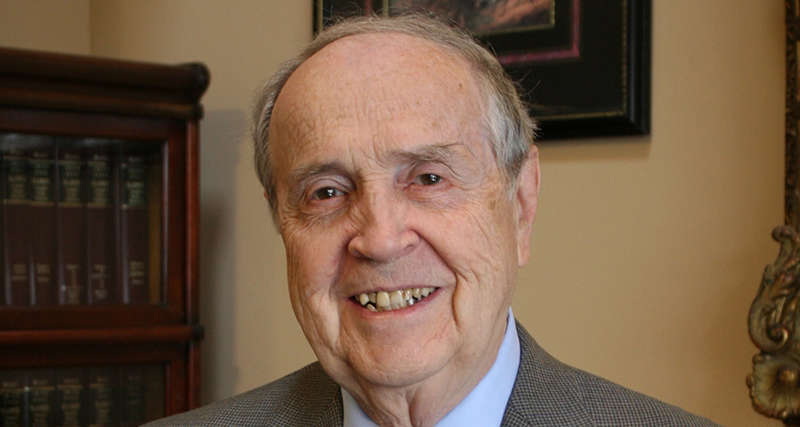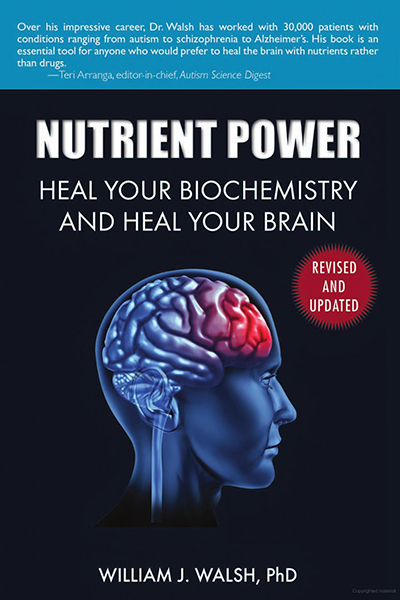
William J. Walsh, PhD Research Publications and Book
Periodical: Alternative Therapies in Health and Medicine
Date published: March-April 2008
Authors: Woody R. McGinnis, Tapan Audhya, William J. Walsh, James A. Jackson, John McLaren-Howard, Allen Lewis, Peter H. Lauda, Douglas M. Bibus, Frances Jurnak, Roman Lietha, Abram Hoffer
Summary: The article discusses the discovery of a urinary marker, called the "mauve factor," which is associated with many behavioral and neurological conditions. The authors present evidence that the mauve factor is a byproduct of abnormal tryptophan metabolism and that it is a reliable indicator of a number of underlying biochemical imbalances. The article also explores the implications of the mauve factor for the treatment of behavioral and neurological disorders. An erratum for the article was published in the May-June 2008 issue.
Periodical: Altern Ther Health Med
Date published: 2008 May-Jun
Authors: Woody R McGinnis, Tapan Audhya, William J Walsh, James A Jackson, John McLaren-Howard, Allen Lewis, Peter H Lauda, Douglas M Bibus, Frances Jurnak, Roman Lietha, Abram Hoffer
Summary: This is Part 2 of a two-part review on the Mauve Factor, a urinary biomarker observed in patients with various psychiatric and neurological conditions. The review discusses the discovery, characterization, and diagnostic significance of the Mauve Factor, as well as its association with oxidative stress and imbalanced biochemistry. The review also explores the potential benefits of treating the Mauve Factor with individualized nutrient therapy.
Periodical: J Child Adolesc Psychopharmacol.
Date published: 2017 Nov
Authors: Jessica L Hambly, Kelly Francis, Sohil Khan, Kristen S Gibbons, William J Walsh, Brett Lambert, Chris Testa, Alison Haywood
Summary: The study aimed to investigate the efficacy of a micronutrient supplement in reducing violent and aggressive behavior in male youth. The study involved 100 participants, and the results showed significant improvements in aggressive and delinquent behavior after 16 weeks of micronutrient therapy. The authors suggest that micronutrient therapy may be a promising adjunctive treatment option for violent and aggressive male youth.
Periodical: Physiol Behav.
Date Published: August 1997
Authors: W J Walsh, H R Isaacson, F Rehman, A Hall
Summary: This clinical trial examines the relationship between elevated copper and zinc levels and violent behavior in adolescent males. The results indicate that adolescent males with a history of violent behavior have significantly higher blood copper levels and copper/zinc ratios than nonviolent controls. The findings suggest that elevated copper levels may be related to violent behavior and that normalization of copper and zinc levels through targeted nutrient therapy may be beneficial in reducing violent behavior.
Periodical: Physiology & Behavior
Date published: October 15, 2004
Authors: William J Walsh, Laura B Glab, Mary L Haakenson
Summary: This clinical trial aimed to investigate the effectiveness of biochemical therapy in reducing violent behavior. The study involved 18 violent male inmates, who were given a nutrient formula designed to correct imbalances in blood chemistry associated with aggressive behavior. The results showed a significant reduction in violent behavior among the participants, providing support for the role of biochemical factors in violent behavior.
Periodical: Archives of Neurology
Date published: August 2006
Authors: Yuemang Yao, William J Walsh, Woody R McGinnis, Domenico Praticò
Summary: This study investigated the association between oxidative stress and the pathophysiology of autism. The authors examined the levels of oxidative stress markers in plasma samples from 26 autistic children and 12 age-matched control subjects. The results showed that the autistic children had significantly higher levels of oxidative stress markers compared to the control group, suggesting that oxidative stress may play a role in the vascular phenotype in autism.
William Walsh's book, "Nutrient Power: Heal Your Biochemistry and Heal Your Brain,"
presents a science-based nutrient therapy system that aims to help individuals diagnosed with mental disorders such as ADHD, autism, behavior disorders, depression, schizophrenia, and Alzheimer's disease. The book emphasizes the need for drug-free, natural therapies that do not produce serious side effects, and presents individualized nutrient therapy treatments based on the author's extensive database of chemical factors in blood, urine, and tissues. Walsh's approach is more scientific than the trial-and-error use of psychiatric drugs and is aimed at a true normalization of the brain. The book has been updated to cover the latest scientific developments in brain research and advanced nutrient therapies, and is a must-read for individuals, families, and medical practitioners looking for a new direction in psychiatric health care.
Read the Reviews and Purchase on Amazon
Or Purchase Directly from the Non-Profit - Walsh Research Website

